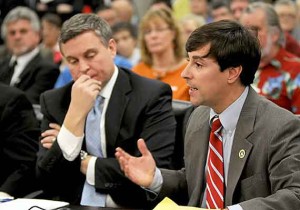Nelson Countians testify before House panel on NGL pipeline concerns
By JIM BROOKS
Nelson County Gazette

Rep. James Kay, D-Versailles, presents a bill on property owner rights to the House Judiciary Committee as committee chair Rep. John Tilley, left, D-Hopkinsville, looks on. Keith Metcalfe, magistrate of Nelson County’s 1st District, watches from his seat behind Tilley. Photo by LRC Public Information.
Thursday, Feb. 19, 2014, 1 p.m. — Nelson County residents and Rep. David Floyd testified Wednesday afternoon before the House Judiciary Committee in regard to eminent domain legislation that could affect the proposed Bluegrass Pipeline.
The committee held no vote on the measure, though its members heard two hours of testimony in support and in opposition to House Bill 31, a measure that would clarify the use of eminent domain proceedings in Kentucky.
Amy Boone, a native of Nelson County and the daughter of Nolan and Becky Boone, told the committee the threat the pipeline represents to her family’s Nelson County farm. She told legislators she and her family found survey stakes on their farm, indicating a path that would cut the farm in half.
“If the pipeline is put there, it will put my Mom and Dad at risk,” she said.
She said a property owner adjoining their farm had sold a pipeline easement, and if the pipeline followed that path, it would require them to cross their farm as well as the Abbey of Gethsemani property.
She described the last few months dealing with the pipeline issue as “a nightmare for myself, my family members and our neighbors.”
“I’m not here to debate if pipelines are safe,” she said. “I’m here because I know many of you have been heavily lobbied by Williams and Boardwalk, and i believe their agenda is very clear,” she said. “They do not want you to pass legislation that would allow families like mine to protect our land from a pipeline we don’t want, and a pipeline that doesn’t serve Kentuckians.”
“Please give us the right to say ‘no.’ ”
State Rep. David Floyd, the bill’s main sponsor, noted the measure would not prevent or restrict a landowner from selling an easement if he or she wished to do so.
“The issue is the right of the landowners who wish to say ‘no’ to requests to sell an easement,” he said.
Joe Boone, a fifth-generation Nelson County cattle farmer, explained how the spectre of eminent domain hangs over the head of every landowner in the pipeline’s path.
Boone said a pipeline representative told him at their first meeting the company had the right to use eminent domain for the project. That was one reason he went along with their request to survey his land.
“I figured I might as well go along with it because I could lose a lot of money trying to fight it and I wouldn’t be able to win,” he said.
Boone later learned at a pipeline meeting that he could indeed say no to the surveyors, and that the question of eminent domain was not settled. He rescinded his survey permission and told the company he had no interest in selling an easement.
But the easement question resurfaced last November when surveyor returned and surveyed property on both sides of his farm. “To this date, the survey stakes are still there, on both sides, leading up to my property,” Boone said. “It’s obvious to me what they have planned.”
Boone asked legislators to pass “the strongest legislation possible” to protect landowners who did not want to sell an easement to the pipeline.
Representatives from commerce and industry, including the state’s oil and gas producers association, the state chamber of commerce and the Kentucky Association of Manufacturers, spoke against the bill.
Andrew McNeil of the Kentucky Oil and Gas Association said the legislation could be a hindrance to future energy production in the state.
“The language isn’t specific enough to protect gathering lines for Kentucky’s gas and oil producers,” he said.
Judiciary committee Chairman Rep. John Tilley disputed that claim.
“I think we’re overcomplicating this issue,” Tilley said. “We’re simply seeking to clarify eminent domain. It’s a simple issue.”
Tom FitzGerald, director of the Kentucky Resources Council, told the committee HB 31 is necessary to protect the rights of property owners.
The natural gas liquids (NGLs) the pipeline would carry are not governed by the same statutes as oil and gas pipelines, he said. The purpose of the pipeline is not in service to the public, which is an important distinction in light of HB31.
Natural gas pipelines must obtain a certificate of need that the pipeline is actually needed. No such requirement is attached to NGL pipelines.
“Natural gas pipelines have one set of requirements, natural gas liquids pipelines have another set of requirements. Neither of them requires a permit,” he said. “There is no one minding the store when it comes to NGL pipelines when it comes to routing.”
Some states have created or are creating siting boards so state regulators have a voice in where these pipelines go.
The hearing ended before all who wished to testify had an opportunity to do so. Tilley said he hoped to bring the issue back before the committee for additional testimony.
-30-






